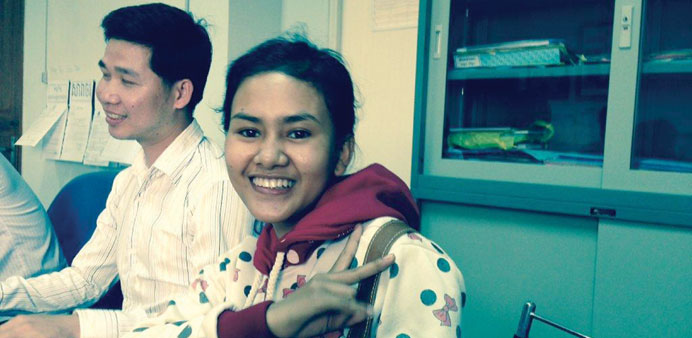In the Kandal province of Cambodia’s capital Phnom Penh, Qatar’s leading educational not-for-profit organisation Rota has worked wonders, as it has with several other small towns and cities.
Rota, which extends a helping hand to those in need of quality education all through the Asian continent, has brought about a significant change in the province with its work. The Hun Sen Rota Technical Vocational Education Training (TVET) School was bolstered by an initial $5mn and a 10-year investment in Cambodia to provide access to secondary level education as well as vocational training for the communities within and surrounding the Kandal province.
A sprawling General Education/TVET campus with nice facilities sees a lot of hustle and bustle, but girls, here, are still a minority. Rota volunteer Nahla Abu Eissa shares her experience working at the school, through the eyes of two students:
“The affable Loeun Rithy is one of three girl students at the Rota TVET Practical School. The 20-year-old, who joined two years ago, aspired to learn more at school. Rithy’s story is an exemplification of the interesting intersection of tradition and modernity – a village girl happily learning how electrical equipment work.
Hailing from a family of farmers did not douse her ambition of mastering a skill that would realise her dreams. Although she seems content with learning electrical skills at Rota TVET School, her eye is trained on IT. She would like it if the IT skills classes were available as part of Rota TVET School Curriculum.
As she talks about the need to set up more practical classes, her face loses some of its enthusiasm. She attributed the high drop-out incidence to the insufficient practical classes as compared to the theoretical ones. “The curriculum which offers more theoretical classes would bore students and eventually lead them in dropping out of school,” she told me.
However, Rithy points out that this year, the school administration is changing the curriculum so that it has more practical than theoretical classes – something she believes will encourage more students to join and bring down the drop-out numbers. She feels she would have enjoyed her past two years in school more if the curriculum offered more practical lessons.
To ensure that the project paves the way for economic change and thereby sustainable livelihoods and better future for the students, Rota and its partners in Cambodia are looking for the engagement of the surrounding community and the industrial sector. This is also the hope of students like Rithy, who says that by graduating from Rota TVET School, she hopes to find more employment opportunities.
As for Theara, a student at the Rota Hen Sun General School, she lives in the nearby Sonlung village. Inspired by her mother, a teacher, Theara chose to join the general school two years ago when she was 13. “My mother encourages me to finish my studies and go to university,” says Theara, whose father is a farmer.
The 15-year-old has two sisters and a brother, and her eyes reveal ambition. Her daily trip to the school doesn’t happen without effort. “I ride my bicycle every day,” she told me of her 20-minute ride to the Rota school.
She excitedly talks about academics, confessing that she mostly enjoys sciences – Biology and Chemistry, and also Maths, and looks forward to her English class. Her dream is to continue studying sciences in the university and become a pharmacist.
Theara enjoys the school environment and all the facilities. She calls the library as one of her favourite places in the school. “Being in a Rota School inspires me. It gives me a chance to read science books and also other non-school books,” she said.
However, Theara would like it if more science books were included in the library, more time was allowed at the computer lab, and more computer skills were taught in the school. The school campus is an amazing structure. It has more than 50 classes and can accommodate 2,000 students.
She also seems fascinated by the idea of skills training. In terms of the kinds of skills, she thinks it would be great if they have more skills suitable for girls, such as hairdressing, or make-up, explaining how “women and girls in nearby villages are more interested in hair styles and make-up than in clothes. They are ready to travel far only to get their hair or make-up done. So a hair and make-up business would be successful.”
Theara’s ambition, optimism and passion for learning would inevitably lead her to a bright future. She could be a great role model for other girls in the community and her dream can help change other girls’ lives.

CLASS OF 2015: Loeun Rithy is one of three girl students at the Rota TVET Practical School.
